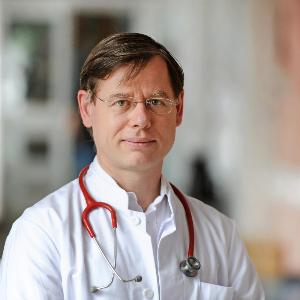Spotlight on sick kids
14 Jun 2021
The Health Lecture given by LMU pediatrician Christoph Klein focuses on rare, severe, chronic, and poorly understood diseases that affect children.
14 Jun 2021
The Health Lecture given by LMU pediatrician Christoph Klein focuses on rare, severe, chronic, and poorly understood diseases that affect children.

© Klinikum der Universität München
Pediatrics is a relative newcomer to the spectrum of medical specialties. Its practitioners combine the empirical, evidence-based approach of modern medicine with an astute understanding of the emotional needs of their young patients. By bringing together insights drawn from biology, psychology and sociology, the discipline has reduced the incidence of child mortality by over two orders of magnitude since its inception. However, in spite of significant advances in the diagnostics, treatment and prevention of the major causes of life-threatening diseases of childhood, many illnesses that become manifest in the early years of life still constitute a serious threat to survival. In his lecture, Professor Christoph Klein focuses on the plight of children who suffer from rare, complex and chronic illnesses, and discusses how novel interdisciplinary approaches to their study can lead to effective treatments.
What are the main distinctions between pediatric medicine and the medical disciplines that concentrate on conditions that typically emerge in later life?
The realization that children are not simply “miniature adults” goes back to the philosophers of the Enlightenment. This basic insight then led to the development of educational programs for children and subsequently to the emergence of pediatrics as a specialized branch of medicine. Modern pediatrics now covers a whole spectrum of sub-disciplines. This is because childhood illnesses differ from those found in adults not only from a biological perspective, but also in terms of their psychosocial impact on the individual patient. What unites the field as a whole is a comprehensive approach to care, which takes account of the individual patient’s developmental age and of how s/he experiences the world.
How can novel forms of interdisciplinary collaboration improve outcomes in the field?
Although pediatrics has developed its own specific profile, it still depends on input from other disciplines. Interdisciplinary cooperation in the best interests of our young patients is therefore indispensable. Only by transcending boundaries between disciplines and between geographical regions can we hope to extend the limits of our knowledge of the underlying causes of the diseases that specifically befall young children and adolescents. This in turn is vital for the development of new diagnostic and therapeutic methods, and – importantly – effective preventive strategies. Effective interventions early on are the key to the restoration of health, and lay the foundation for a healthy and prosperous life.
Which types of rare diseases do you focus on, and why is it so difficult to understand and successfully treat them?
Over the past two centuries, pediatricians have achieved a great dead, as evidenced by the fact that child mortality is now one hundred times lower than it was in the 19th century. – As a pediatric oncologist, I’m happy to say that we can now durably eliminate 80% of all childhood cancers. The real challenge is to extend these clinical achievements to a whole range of rare diseases which are currently incurable. Many of those who now die in childhood succumb to complications that arise from uncommon but highly complex conditions. We have to find ways of identifying the causes of these diseases with the aid of well-founded scientific methods (most of them are associated with genetic mutations) and then develop, test and apply new therapies to combat and cure them. This is a complicated and protracted process. Our Care-for-Rare Foundation, Germany’s first foundation devoted to the investigation and treatment of children with rare diseases, helps us to stimulate and support this life-saving research – in Munich and beyond.
Prof. Dr. Dr. Christoph Klein ist Direktor der Kinderklinik und Kinderpoliklinik im Dr. von Haunerschen Kinderspital an der LMU München. In seiner Forschung beschäftigt sich der pädiatrische Immunologe, Onkologe und Hämatologe mit seltenen, komplexen Erkrankungen.